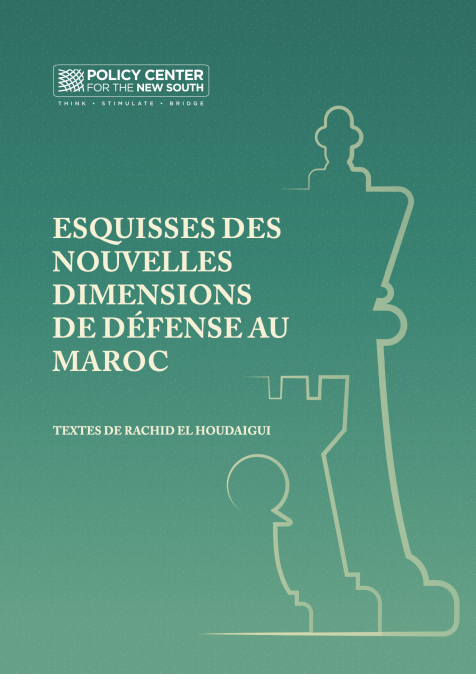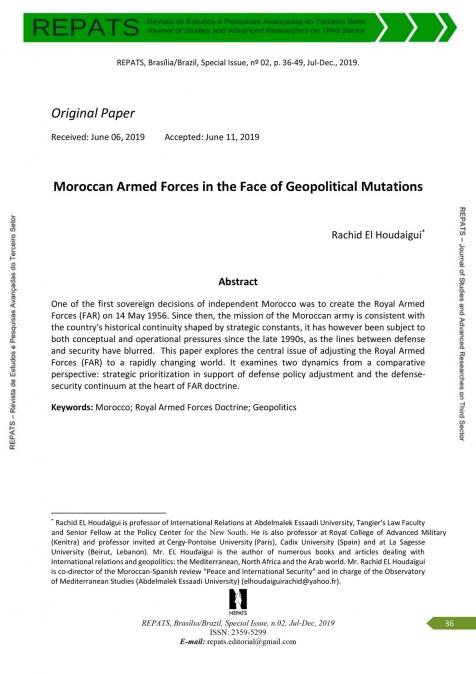Publications /
Opinion
On 29 May 2018, at the Summit organized by French President Emmanuel Macron at the Palais de l'Elysée in Paris, the four main players in the Libyan crisis approved a "Political Declaration on Libya" calling for the organization of both legislative and presidential elections on 10 December next. This "historic" text, as described by the French Head of State, is nevertheless in jeopardy given the complexity of the current situation in Libya.
There have been countless initiatives to bring Libya out of the chaos in which the country has been plunged since the fall of Colonel Muammar Gaddafi's regime in 2011. To date, none have succeeded. Fragmented by the competing aspirations of a multitude of political players vying for control of whatever portion they can get of this hydrocarbon-rich territory, three times the size of France, the country is presently a blazing inferno for its inhabitants and a huge source of destabilization for the whole of North Africa and the Sahel.
By convening four of the main protagonists in the Libyan crisis under the auspices of the United Nations and in the presence of representatives of twenty countries and six international organizations, has the French President found the right way to help Libyans make peace?
By obtaining a solemn commitment to hold the elections on 10 December, the French Head of State has undoubtedly snatched an important concession from his hosts who, incidentally, were gathered around the same table for the first time, given the pressing need to provide Libya with legitimate state and political institutions in order to initiate a way out of the crisis for this country, which has been devastated by seven long years of conflict. However, it is not certain that "this diplomatic stunt" by the Elysée will be enough for a rapid return to peace in Libya.
The Paris text is not an agreement, strictly speaking. Entitled "Political Declaration on Libya", the document was neither initialed nor signed. It only garnered a verbal approval, which the French President, followed by the Special Representative of the Secretary-General of the United Nations, Ghassan Salamé, nevertheless hastened to describe as a "key" and "historic" stage for reconciliation in Libya.
While they are indisputably important figures in Libya today, the head of the " Government of National Accord " (GNA), Fayez Al-Sarraj, the Libyan National Army (LNA) leader, Marshal Khalifa Haftar, the Speaker of the House of Representatives (exiled in Tobruk), Aguila Salah Issa, and the President of the State Council (an advisory body stemming from the inter-Libyan agreement signed in Skhirat, Morocco, in December 2015, and based in Tripoli), Khaled Al-Mishri, are not the only protagonists in the Libyan crisis. There are Jihadist armed groups which are rife all over the country, important tribes, ethnic groups, but also communities that have remained faithful to the political heritage of the departed colonel, who hardly recognize the legitimacy of the quartet hosted by Macron. Some of them are openly fighting them. By ignoring these "local forces," which the United Nations mediator for Libya nevertheless placed at the heart of the "Action Plan" he announced in September 2017 and, which aims to make the organization of elections contingent on the holding of a "National Conference," the Elysée Summit undoubtedly made a first, possibly fatal, mistake in relation to the anticipated outcome.
Oddly enough, the French plan also failed to address another important point: the constitutional framework within which legislative and presidential elections should take place. There is no valid constitution in Libya, only a "Constitutional Declaration", drafted in August 2011 by the interim authorities installed in Tripoli after the fall of Colonel Gaddafi. This provisional text was to be replaced by a new Fundamental Law adopted by a college of only 60 members. Ultimately, the text was not adopted as a result of the civil war that broke out in the summer of 2014, but also due to the irreconcilable demands of certain political figures. The forces based in Cyrenaica (East) are demanding federal structures, while those based in Tripolitania (West) are calling for the maintenance of a unity state. As for ethnic minorities, such as the Toubous and Tuaregs, they are making their participation in any national reconciliation process conditional on the official recognition of their cultural identity.
A new attempt to provide the country with a Fundamental Law was made in July 2017. The text was indeed adopted. But it was finally rejected by a large part of the House of Representatives, who believe that the eligibility conditions set out, in terms of dual citizenship, length of residence in the country and office held in the army, were a maneuver designed to rule out their "natural candidate", Marshal Khalifa Haftar, from the race to head the state. The Paris Declaration's cautious reference to a commitment to adopt a "constitutional basis" for future elections "by 16 September" does not resolve the problem. Whether it refers to a new constitution to be adopted by referendum or a simple amendment to the "Constitutional Declaration" currently in force, it runs the risk of leaving the door wide open to new quarrels likely to deepen the divide between Libyans.
The Paris Declaration is also threatened by the harsh realities of the security and military situation in Libya. The situation in the three main regions of the country is extremely tense, sensitive and volatile. In the Deep South, there are almost daily clashes between the Toubous African ethnic group and the Ouled Slimane Arabs, or even between one of these communities and neighboring Tuareg groups, with whom they share the region. In the West, in Tripolitania, the "National Accord Government" (GAN) of Fayez Al-Sarraj, which is recognized by the international community, is dependent on its relations with the various militias supporting it, some of whom harbor great mistrust towards a possible rapprochement with Marshal Khalifa Haftar, whom they suspect of having "praetorian" ambitions, following the model of his regional mentor, the Egyptian Abdel Fattah Al Sissi. In the East, in Cyrenaica, despite the undeniable successes achieved by his men in enforcing a semblance of order in the city and its surrounding regions under their control in the face of various armed groups, in particular jihadists, Haftar's Libyan National Army (LNA) soldiers are suspected of serious abuses against the population, to such an extent that the United Nations has spoken of a "devastating impact on civilians".
In such a context, it would be almost a miracle to succeed in holding "credible and peaceful elections and to uphold the results of the elections when they take place," as called for by Emmanuel Macron.








